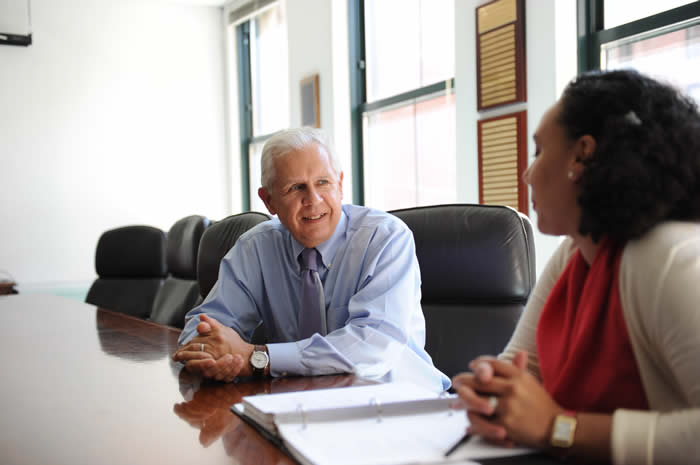Representing the Underdog
Civil Litigation Program Director Robert Burdick has been guiding students in real-life cases for 43 years.
 As director of the Civil Litigation Program at Boston University School of law, Robert G. Burdick, recently promoted to clinical professor of law, guides students as they represent impoverished, mentally ill, and disabled clients in real-life cases. He has led significant litigation in a number of areas involving anti-discrimination lawsuits, tenants’ rights cases, and insurance company claim settlement practices.
As director of the Civil Litigation Program at Boston University School of law, Robert G. Burdick, recently promoted to clinical professor of law, guides students as they represent impoverished, mentally ill, and disabled clients in real-life cases. He has led significant litigation in a number of areas involving anti-discrimination lawsuits, tenants’ rights cases, and insurance company claim settlement practices.
“My students are learning how to be litigators in a civil context… I’m teaching them how to represent clients through negotiation and trial,” says Burdick.
Burdick has been teaching negotiation in civil law contexts for almost 43 years. In that time, he has adopted new teaching methods to best fit his students’ learning: “We were trying to figure out what our students could take with them in the limited time they were in our clinic and, apply it to their practice,” he says. “It’s about how professionals can learn from experience to get better, but also developing and testing models in their practice…we are trying to do that for our students.”
In 1975, while teaching clinic students at Boston University, Burdick found negotiations simulations to be a powerful way to learn. He designed his own teaching model specifically aimed at developing negotiation skills for students enrolled in the Employment Rights and the Housing, Employment, Family & Disability clinics. The model has become a basis for teaching conflict resolution skills to middle and high school students in the Boston area.
Aside from working on civil suits and teaching at BU Law, Burdick has led negotiation-training programs for the Washington State Legislature and Alaska’s Attorney General’s office. He also teaches negotiation skills at Tufts University, Northeastern, and to a number of public sector clients.
While many people view negotiating as a form of bargaining, Burdick disagrees, arguing that mindset is a very narrow frame: “I think there are many other skills and strategies involved. You persuade somebody else to satisfy your interest… it is the most important skill that we have in society. I’m trying to teach a very broad concept of negotiation, and each example of that is similar enough that you can teach a framework to students.”
Legal clinics and other experiential opportunities, Burdick says, give law students an opportunity to learn the hands-on legal skills that are just as important as knowing the legal rules and being able to analyze those rules.
“To some extent, knowing the rules is a small part of what lawyers do. They also need to learn how to counsel, negotiate, and interview clients. They need a set of technical skills to perform in those institutions. You don’t know it by yourself,” says Burdick.
One of Burdick’s own early experiences working on Rogers v. Dept. of Mental Health taught him the value of the kind of hands-on training students receive in the clinics. The landmark case was first filed in 1975 and eventually made its way to the Massachusetts Supreme Judicial Court, which set the Rogers standard for determining a patient’s incapacity to made decisions about their mental health treatment.
“The Rogers case was the biggest case I was ever involved in. It involved a 74-day trial in several district courts. I was on a team with other lawyers, and it went to the United States Supreme Court. It lasted close to 11 years,” says Burdick. “I learned a lot from other lawyers, and I learned a lot just by being in court so much. It kind of eliminated the fear of trial work.”
In 2015, Burdick helped launch Lawyers for Affordable Justice (LAJ), a program created in partnership with Boston College and Northeastern University law schools and designed to help recent graduates earn experience while providing a below-market rate for clients who can’t afford market-rate services.
Each year, approximately 12 attorneys from the three participating law schools are selected to participate in the two-year program through a competitive application process. LAJ assists new lawyers as they develop successful solo practices and help the community and those who need legal services. Burdick is one of three directors of the program, and is the mentor for the solo practitioners doing landlord–tenant work.
In recognition of his dedication to his students, his clients, and his service to the public good, Burdick was the 2016 recipient of BU Law’s Pro Bono and Public Service Faculty award. “I knew in law school that I liked representing the underdog, but I also knew I would be more helpful to my clients on the civil side, rather than the criminal side,” he says. “Ever since then I’ve never looked back.”
Reported by Natalie Carroll (COM’19)
Related News
- Lawyers for Affordable Justice: Reasonably Priced Legal Help
- BU Law Celebrates Pro Bono & Public Service Accomplishments of Students, Faculty
- Civil Litigation Program Helps Students Develop Pre-Trial Skills